You may find it challenging to get the amount of protein you need if you’re an athlete or bodybuilder who follows a plant-based diet. (1) Protein powders are a convenient way to boost intake, but you may wonder how plant-based protein powders measure up, especially when compared to the gold standard, whey protein isolate powder. (2)
Kaged is a sport supplement brand that may have what you’re looking for in their plant-based, vegan-friendly Kaged Plantein protein powder. This high-quality supplement is a protein-packed powder rich in branched-chain amino acids (BCAAs) and high in leucine, providing all the nutrition you need to maintain and build muscle. In our Kaged Plantein review, we take a closer look at the vegan protein powder to see how it measures up to the clinical evidence and if it can deliver on its promised benefits.
Disclaimer: Kaged Plantein is currently unavailable, as the brand has discontinued the product. After speaking with Kaged, there is a possibility that Plantein may return next year; however, this is not guaranteed. In the meantime, Kaged offers three other protein products: a whey protein isolate, a tri-isolate, and a casein. We will update this review as more information becomes available.
Medical disclaimer: This article is intended for educational and informational purposes only. It is not intended as a substitute for medical advice. For health advice, contact a licensed healthcare provider.
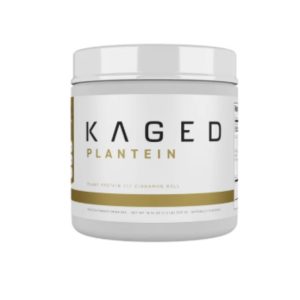

Key product features
What you should know
Kaged Plantein is a vegan protein powder that uses a patented technology called Ingredient Optimized® that purportedly improves pea protein absorption and utilization. Each scoop provides 25 grams of protein, 4.5 grams of branched-chain amino acids (BCAAs), and 2.1 grams of leucine to support muscle building.
- Pea protein isolate, organic quinoa, and medium chain triglyceride (MCT) oil powder are the main ingredients in Kaged Plantein.
- At $2.00 per serving, or $0.10 per gram of protein, Kaged Plantein is priced higher than the average market price for plant-based protein powders.
- This is a good plant-based protein powder for vegan bodybuilders struggling to meet their high protein needs when bulking up.
- Currently, Kaged Plantein is only available in one flavor: cinnamon roll.
- The pea protein powder uses natural and artificial nonnutritive sweeteners, including stevia and sucralose, and may not work for people who want to avoid artificial sweeteners.
Kaged Plantein overview
Kaged is a sport supplement company that makes many sports nutrition products including pre-workout supplements, protein powders, creatine powder, and hydration drinks.
Protein is a key nutrient for maintaining and building muscle, and Kaged offers several protein powder options. Plantein is their high-absorption, vegan protein powder for people looking for a plant-based option.
Kaged Plantein ingredients
Kaged Plantein has only six ingredients. We prefer supplements with fewer ingredients for its simplicity, especially when most of the ingredients are natural.
The key active ingredients in Kaged Plantein include:
Pea protein isolate
Pea protein is gaining in popularity because of its protein quality, price, hypoallergenicity, and digestibility. (3) Pea protein isolate is a type of pea protein that’s undergone additional processing to remove most of the carbohydrates and fat from the powder, creating a higher concentration of protein with a more balanced amino acid profile. (3)
Pea protein isolate is rich in the amino acids that stimulate muscle protein synthesis—the BCAAs isoleucine, valine, and leucine—in amounts similar to whey protein, the gold standard protein powder for muscle building. (2, 4) Though the pea protein isolate is a complete protein, meaning it has all of the essential amino acids (EEAs), it’s lower in methionine and cysteine than whey protein. (4)
But when it comes to muscle-building, pea protein works as well as whey, according to a 2019 study published in the scientific journal Sports. (4) In this study, a small group of men and women following a high-intensity functional training (HIFT) program were given 24 grams of either whey or pea protein powder one hour before and after workouts, respectively. (4) The researchers found no difference in body composition, muscle thickness, or strength between the two groups at the end of the eight-week study periods. (4)
Pea protein isolate is the main ingredient in Kaged Plantein.
Organic quinoa
Organic quinoa is another key ingredient in the premium vegan protein powder. Quinoa is a seed, but it is typically cooked and used like a grain. (5) Quinoa has all of the EAAs, but is low in leucine and is considered a nearly complete protein. (5) Adding quinoa to the pea protein in Kaged Plantein improves the supplement’s amino acid profile.
MCT oil powder
MCT oil is a popular ingredient in sport supplements because of the belief that it serves as a quick source of energy. (6) MCT, short for medium-chain triglyceride, is a type of saturated fat that’s absorbed and utilized by the body faster than long-chain triglycerides (LCTs). (6)
MCT also produces larger amounts of acetyl-CoA than carbohydrates. (6) Acetyl-CoA is one of the molecules cells need to produce energy, which is why MCT oil is believed to benefit energy levels. (6, 7) However, research fails to consistently show that supplementing with MCT oil improves energy or endurance in athletes. (6) Further, it may cause unwanted side effects like gas, bloating, or diarrhea. (6)
The MCT oil powder in the vegan protein supplement comes from coconuts and isn’t suitable for people with tree nut allergies.
Other ingredients
Natural flavors, steviol glycosides, and sucralose make up the remaining ingredients in Kaged Plantein. Natural flavors means the flavoring in the protein powder comes from natural sources. (8) For sweetness, Plantein uses steviol glycosides, a natural calorie-free sweetener from the stevia plant, and sucralose, an artificial calorie-free sweetener. (9, 10)
The natural flavors and sweeteners improve the taste of the protein powder. Though we do like that Kaged uses natural flavors and natural sweeteners, we deducted some points for the sucralose. Artificial sweeteners are generally recognized as safe, but there are some concerns about how they may affect human health. (10)
A 2023 review article published in Cureus pointed out some of the issues related to the use of artificial sweeteners, including headaches and stomach upset, as well as its potential links to cardiovascular disease and type 2 diabetes. (10) Limiting your intake of artificial sweeteners is recommended to limit risk of health problems.
Kaged Plantein nutrition facts
One scoop of Kaged Plantein has 25 grams of protein, 4 grams of fat, 2 grams of carbohydrates, and 150 calories. Most of the calories in the protein powder (67%) come from its protein content, with the rest coming from mostly fat (24%) and a small amount of carbohydrates (6%).
The International Society of Sports Nutrition (ISSN) recommends a dose of 20 to 40 grams of protein at regular intervals to maximize muscle protein synthesis when strength training. (2) Protein content is an important part of our review process for plant-based protein supplements, since some powders may contain less than 20 grams a serving. With 25 grams per scoop, Kaged Plantein provides an adequate amount of protein to support fitness goals. However, we give more points for supplements that have 26 or more grams of protein per serving.
The higher fat content in Kaged Plantein comes from the added MCT oil powder, which also provides 1.5 grams of saturated fat, meeting 8% of the daily value. High intakes of saturated fat increases risk of cardiovascular disease. (11)
Though there’s some evidence that saturated fat from MCT oil has less of an effect on heart health than the saturated fat in animal products, health authorities recommend limiting overall intake of the unhealthy fat to protect heart health, no matter the source. (11, 12) The extra calories from fat also lowers the protein concentration in the supplement, affecting its score in our rating process.
Overall carb content in Kaged Plantein is low, and the product has no added sugar and provides 1 gram of fiber, meeting 4% of the daily value.
We like that Kaged Plantein meets 30% of the daily value for iron. Iron is an essential mineral and critical component of hemoglobin, the red blood cell that carries oxygen from the lungs to the rest of the body. (13) Iron is naturally found in animal and plant foods, but is harder to absorb from plants. (13) People who eat a plant-based diet are more likely to have lower blood iron levels than meat eaters, putting them at risk of anemia (low red blood cell count). (14) The high iron content in Plantein can help those following a vegan or vegetarian diet get more of the essential mineral to reduce risk of deficiency.
Does Kaged Plantein deliver on promised claims?
Kaged refers to Plantein as a premium vegan protein powder that supports muscle gains and recovery. There are no studies evaluating the effectiveness of Plantein at supporting muscle growth and exercise recovery, but its nutrition profile suggests it may help.
The protein powder provides an ideal amount of protein per scoop and is an excellent source of BCAAs. Additionally, one scoop of Plantein has 2.1 grams of leucine. Leucine is the essential amino acid that drives the muscle-building process. (15) The ISSN says acute doses of leucine ranging from 700 to 3,000 milligrams is ideal for muscle building. (2)
Fast-absorbing proteins that are bioavailable also support muscle building and is one of the reasons whey protein powder is so effective. (2) Kaged Plantein claims superior absorption of their pea protein due to the use of a patented technology called Ingredient Optimized® that alters the protein so it’s more soluble (easier to mix) and dispersible (easier to dissolve), which may then make it more bioavailable (better absorbed and utilized). (16)
There is clinical evidence that Ingredient Optimized pea protein leads to higher blood amino acid levels than standard pea protein. (16) However, the research study supporting this claim is small (only 10 participants) and was funded by the company that owns the technology. (16) Larger, longer, and independent studies are needed to determine the truth of this claim.
How to use Kaged Plantein
Kaged recommends mixing one scoop of the plant-based protein powder with 8 to 10 ounces of cold water. The drink makes a good pre- or post-workout protein shake, but you can consume it anytime you need a protein boost.
Kaged Plantein price
Price is an important factor in our supplement reviews since it plays a significant role in purchasing decisions. At $2.00 per serving, or $0.10 per gram of protein, Kaged Plantein costs more than the average market price for plant-based protein powders. Further, you only get 15 servings per container, making it a tough fit for those on a tight budget who take protein powder daily.
But the higher price point may be worth it with the added safety tests and certifications. Kaged Plantein is third-party tested for quality and potency and Informed Sport certified, meaning it’s tested for banned substances and makes a safe choice for athletes who undergo drug testing for their sport.
The supplement is also a high-quality plant-based protein powder, providing an adequate amount of all the essential amino acids necessary for building muscle, including leucine. It’s also gluten-free and a non-GMO product.
One of the drawbacks of Kaged Plantein is that you have only one flavor choice, cinnamon roll. If you don’t like cinnamon, the vegan protein powder may not make a good fit for you.
What customers are saying
More than 500 Amazon customers have reviewed Kaged Plantein protein powder, giving it an average rating of 4.1 out of 5. Many of the customer reviews say they like the quality of the ingredients in the protein powder, the great taste and creamy texture, and its mixability. However, not everyone likes the taste, and some consumers find the price too high.
Alonzo R. is a verified Amazon buyer of the plant protein who likes the supplement and plans to purchase it again. “Taste great, mixed with cream coconut water pre workout. Will buy again.”
Amazon customer Lauren likes the taste and quality of Kaged Plantein and writes that it’s their new favorite protein powder.
“Very pleased with this protein powder. Exceeded expectations… This Plantein Cinnamon Roll protein powder is truly even better than I imagined and is now my new favorite! Absolutely worth it.”
Lauren, Amazon
Tammy is an Amazon customer who liked the flavor of the pea protein powder, but couldn’t get past the texture, even when mixed with fruit. “Yes the flavor is good but the powder is gritty and does not mix well. I tried mixing it with almond milk and water. I added frozen pineapple that made the mixing even worse. Would not recommend.”
Specs
| Protein source | Pea protein isolate |
| Protein per serving | 25 grams |
| Price per serving | $2.00 |
| Servings per container | 15 |
| Other key ingredients | Organic quinoa, MCT oil powder |
| Flavors | Cinnamon roll |
| Certifications | Informed Sport |
Compare Kaged Plantein
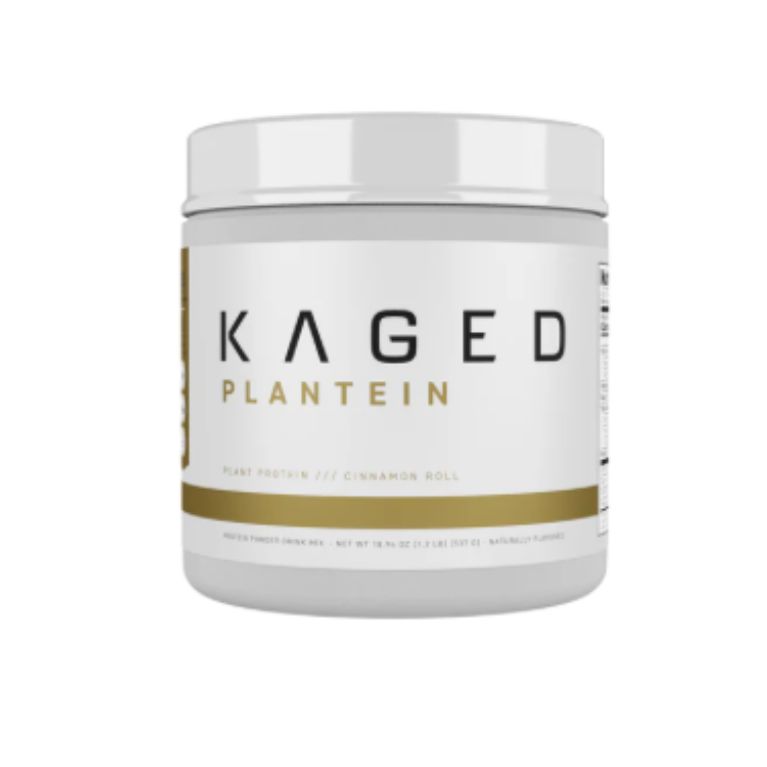
|
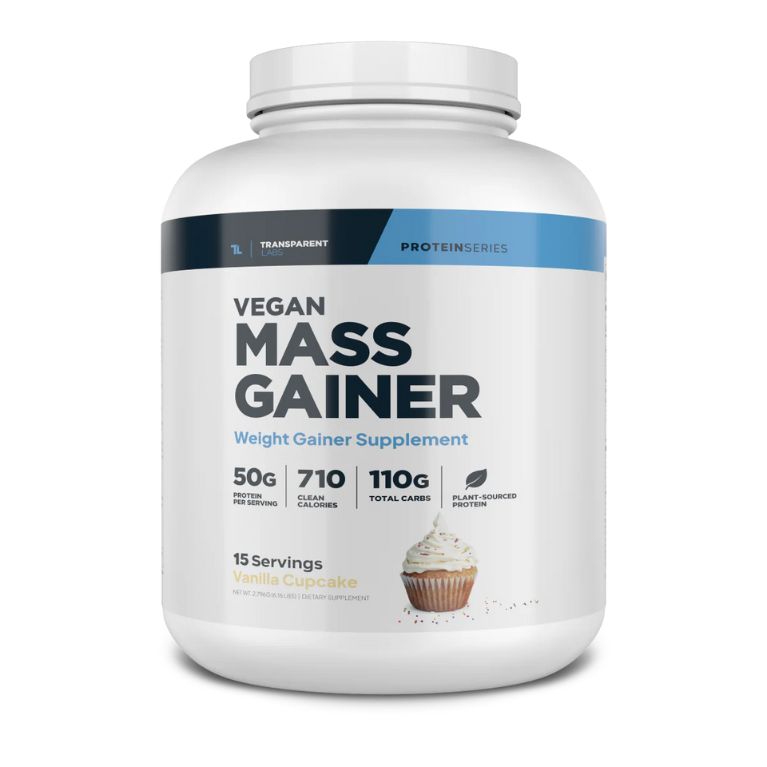
|
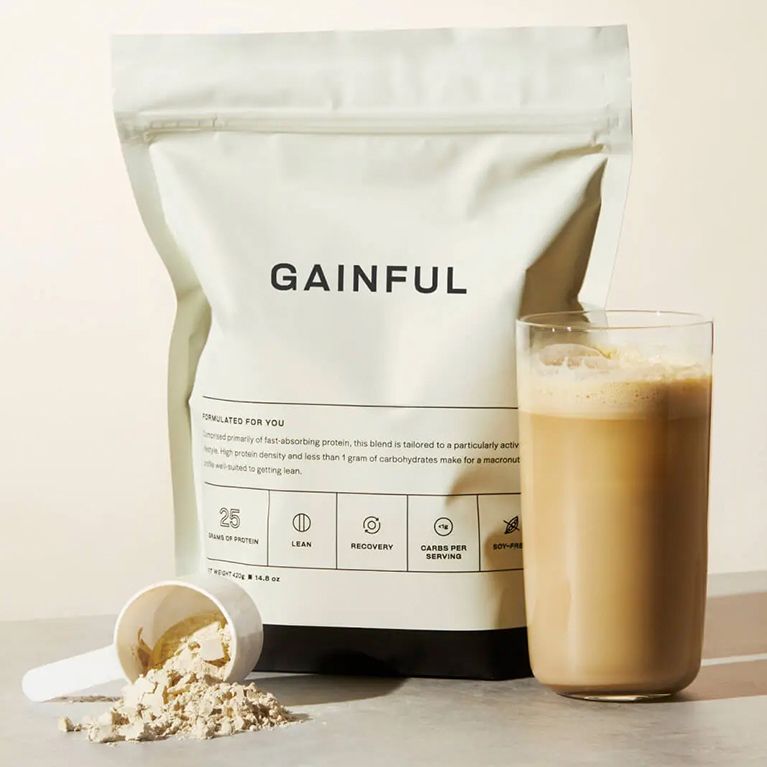
|
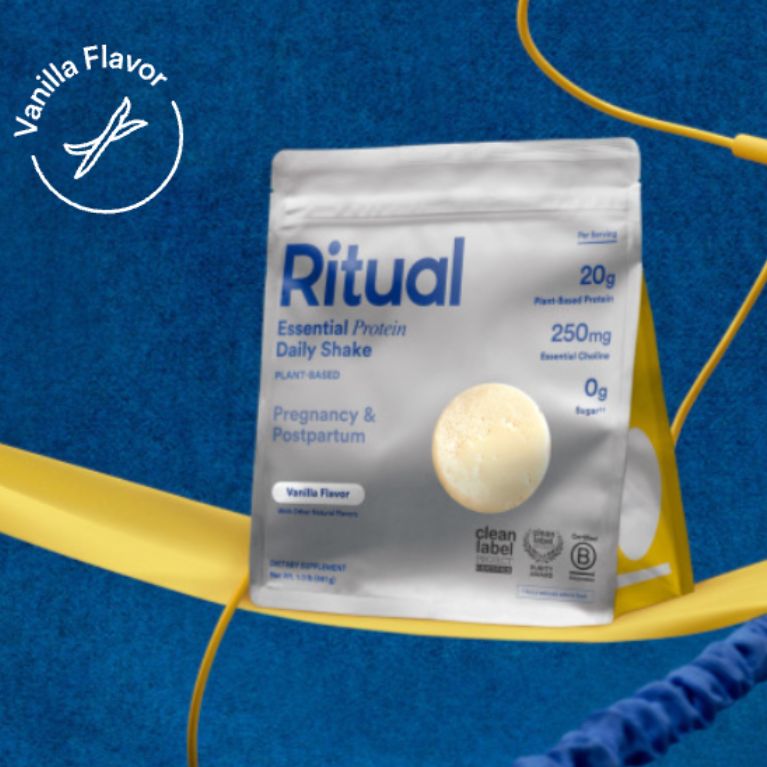
|
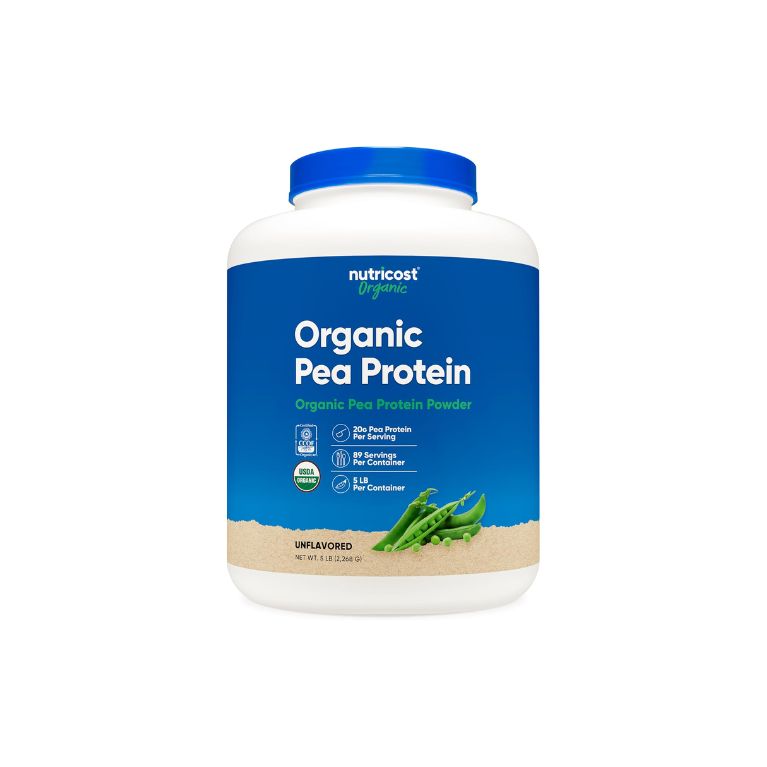
|
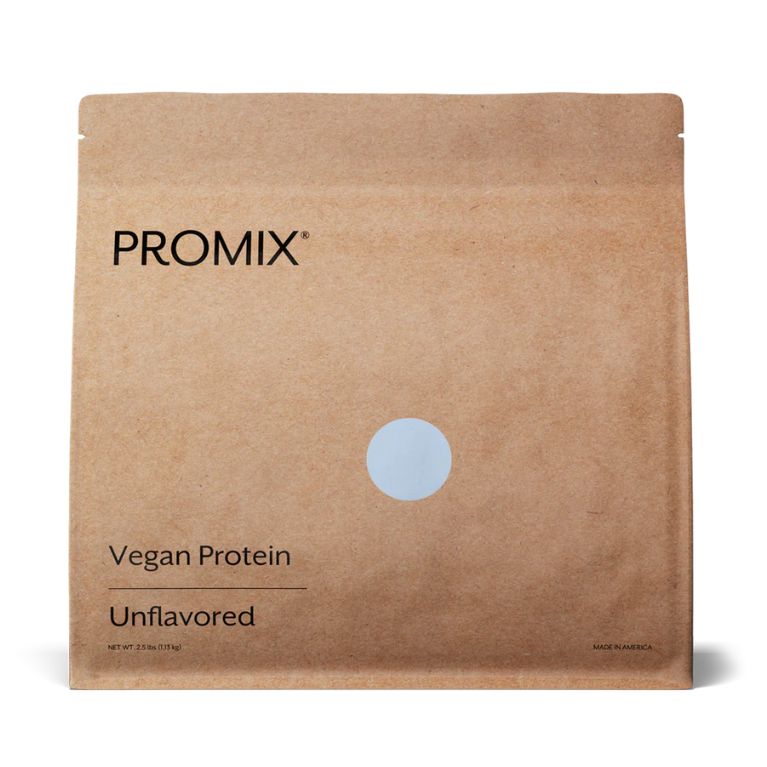
|
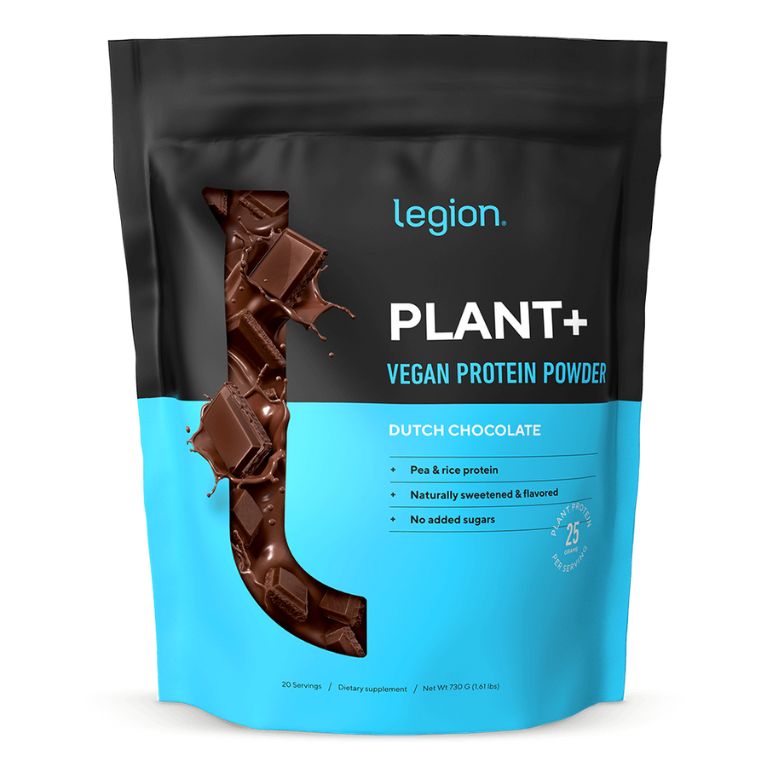
|
|
| Kaged Plantein | Transparent Labs Vegan Mass Gainer | Gainful Customized Protein Powder | Ritual Essential Protein Daily Shake | Nutricost Organic Pea Protein | Promix Unflavored Vegan Protein Powder | Legion Athletics Plant+ Protein Powder | |
| Rating | |||||||
| Firmness | $2.00 | $5.33 | $3.50 | $2.93 | $0.67 | $1.29 | $2.50 |
| Material | Kaged Plantein 4.4 $2.00 Pea protein, organic quinoa | Pea protein isolate | Organic pea protein, organic brown rice protein | Organic pea protein | Organic pea protein isolate | Organic Canadian yellow pea protein isolate | Legion Athletics Plant+ Protein Powder 4.4 $2.50 Pea protein isolate, rice protein concentrate |
| Cooling | 15 | 15 | 14 | 15 | 89 | 38 | 20 |
| Warranty | 25 g | 50-52 g | 24 g | 20 g | 20 g | 25 g | 24-25 g |
How we test plant protein supplements
Given the health benefits, more and more people are looking for ways to add more plant protein to their diet and plant-based protein powders are a convenient option, especially for athletes, bodybuilders, and regular gym-goers. These dietary supplements use peas, soy, brown rice, or seeds as a source of protein. However, not all plant proteins provide all of the essential amino acids like animal-based proteins such as whey or casein.
In order to find the best plant protein products on the market for our reviews, our team created a custom testing methodology and scoring algorithm. Our testing tool allows us to objectively evaluate plant protein powders across six categories, including protein source, protein quality, protein content, other ingredients, and price. Our expert team created the testing methodology with registered dietitian and doctor of exercise physiology Chris Mohr, Ph.D., RD.
Our plant protein powder scoring methodology is based on our broader nutrition product and supplement evaluation criteria. Products are given a score ranging from 1 to 5 for each category. We then weigh each score based on importance and average the numbers to determine the cumulative score for each supplement.
Read our full plant-based protein testing methodology for more detailed information.
Protein source–40%
Protein source is a key category since not all plant proteins are complete proteins and may be missing or have lower amounts of one or more amino acids. The source of protein determines whether the protein powder is complete, providing all of the essential amino acids in adequate amounts. The protein source(s) also influences the calories from protein versus carbohydrates or fats. For this category, we look for eight plant protein sources: soy, pea, hemp, brown rice, lentil, chia, pumpkin seed, and blends.
Complete protein–20%
A complete protein provides all of the nine essential amino acids the body needs to support health, as well as maintain and build muscle. Plant protein powders that are complete proteins receive the highest marks.
Macronutrient calories per serving–15%
Most of the calories in a high-quality protein powder should come from protein. Plant-based protein powders with higher amounts of carbohydrates or fat may receive lower scores.
Total protein per serving–15%
Research shows that getting 25-30 grams of protein at regular intervals is ideal for muscle protein synthesis, helping maintain or build muscle mass. Plant protein supplements may have 15-30 grams of protein per serving. Those with a higher protein content receive higher marks.
Price per gram of protein–5%
Price is an important factor for consumers and sometimes used as a measure of product quality. However, there’s a lot of discrepancy between price and quality in plant protein supplements, which is why this category carries less weight in our overall scoring methodology.
Since protein content is the best measure of value for a plant protein powder, we rate each product based on the price per gram of protein, as well as price per serving.
Sweeteners–5%
Sweeteners may improve the taste of a plant-based protein supplement, making it easier to consume. However, sweeteners may add calories and carbs and provide very little nutritional value. We prefer plant protein powders that use minimal amounts of sweeteners and prefer those that use natural nonnutritive sweeteners.
Certifications
Many supplement companies test their products for safety and label accuracy. However, some supplement brands have additional certifications to ensure quality and safety.
We give bonus points to supplements that take the extra safety step for consumers. We weigh certifications lower than other categories, recognizing that newer and smaller supplement brands may not be able to afford the cost of the additional testing.
Bonus points
The supplement industry is large and constantly changing and we pay close attention to supplement brands and products that go above and beyond to stand out in the crowded market place. To recognize innovative plant-based protein powders, we use bonus points.
All bonus points are equally weighted, providing a slight boost to the product’s overall score. Plant protein formulas are awarded bonus credits for:
- No proprietary blends
- Sustainable packaging
- Added enzymes
FAQs
Is plant-based protein powder good for you?
Plant-based protein is good for people struggling to get enough protein from food. To gain the most benefits, you want a high-quality plant protein powder that provides all of the essential amino acids. (2) Pea protein, soy protein, and plant-protein blends are all good choices. (2)
Kaged Plantein is a plant protein powder blend consisting mostly of pea protein with added protein from quinoa, improving its amino acid profile so it more closely resembles whey protein powder. (2, 4, 5)
What are the side effects of plant protein?
Side effects from a plant protein depend on the source. Pea protein is hypoallergenic and well-tolerated by most people. (4) Some plant protein powders may cause side effects from added ingredients like MCT oil powder or artificial sweeteners. (10, 12) You should avoid any plant protein powder that contains an ingredient you’re allergic to, such as soy or tree nuts.
Unwanted weight gain is another potential side effect you may experience when using plant protein powders if they add more calories than you need. Though protein offers many benefits for weight management, consuming too many calories, no matter the source, leads to weight gain. (17)
Can you build muscle with plant-based protein powder?
You can build muscle with a plant-based protein powder as long as it provides all of the essential amino acids and you’re engaging in regular strength-training exercises. (2, 4) If you can get all the protein you need to build muscle from food, you don’t need a dietary supplement. Plant-based protein powders support nutrition needs, but can’t replace whole foods.
Supplementing with a plant-based protein powder may help preserve muscle in people following a weight loss plan and older adults. (17) However, the only way to build muscle with any protein powder is combining it with a muscle-building workout. (2)
These statements have not been evaluated by the Food and Drug Administration. These products are not intended to diagnose, treat, cure, or prevent any diseases.
Our experts
Lauren Panoff, MPH, RD
Lauren Panoff, MPH, RD is a plant-based registered dietitian, freelance writer, and content strategist for health and nutrition brands. She completed her nutrition education at Colorado State University, her dietetic internship through Michigan Medicine, and holds a Master of Public Health degree from Michigan State University. Lauren has been working in the wellness industry for over 15 years, including time spent in project management, public health standards, dietary supplement testing, inpatient and outpatient nutrition therapy, and child education. She has followed a plant-based lifestyle for over a decade and is passionate about helping others enjoy a healthier and more meaningful life.
Jessica Coulon
Jessica is a contributing editor and writer who specializes in fitness, health, nutrition, and science content. Previously, she was an editor for Popular Mechanics and Bicycling, where she covered pro cycling news, wrote how-to guides, and tested all the latest and greatest bike gear. She was also a regular shoe tester and contributor for Runner’s World. You can often find her skiing or riding her mountain bike, and racing with the F1RE female enduro team.
Joana Neziri, M.S., NASM CPT
Joana is a writer, editor, and content strategist focusing on nutrition, fitness, and all things health. After earning a master’s degree in business from the University of North Florida, she began a career in research and digital marketing.
Kelly Uhler
Kelly has a multifaceted background in elder care, health care, and copywriting. She has worked for organizations such as A Place For Mom and Homecare.com, which gave her the opportunity to work closely with families, providing reliable information to help them make informed.

Jill Corleone, RD
Fortune Recommends Nutrition Writer
About Author
Jill’s life has centered around nutrition and fitness for more than two decades. After earning her bachelor of science in nutrition at New York University in Manhattan, Jill went on to complete her internship at the University of Medicine and Dentistry of New Jersey in Newark.
She spent the early part of her career working as a clinical dietitian with a focus on pediatric nutrition. She then transitioned into management. Jill began her career as a freelance writer in 2007 while working as a clinical nutrition manager in Florida. She became a full-time writer in 2010 after the birth of her first child.
Jill has written for numerous publications, including Verywellfit, Diabetes Self-Management, Huffington Post, Livestrong.com, and SFGate.
References
- Amatori, S., Callarelli, C., Gobbi, E., Bertuccioli, A., Donati Zeppa, S., Sisti, D., Rocchi, M. B. L., & Perroni, F. (2023). Going Vegan for the Gain: A Cross-Sectional Study of Vegan Diets in Bodybuilders during Different Preparation Phases. International journal of environmental research and public health, 20(6), 5187. https://doi.org/10.3390/ijerph20065187
- Jäger, R., Kerksick, C. M., Campbell, B. I., Cribb, P. J., Wells, S. D., Skwiat, T. M., Purpura, M., Ziegenfuss, T. N., Ferrando, A. A., Arent, S. M., Smith-Ryan, A. E., Stout, J. R., Arciero, P. J., Ormsbee, M. J., Taylor, L. W., Wilborn, C. D., Kalman, D. S., Kreider, R. B., Willoughby, D. S., Hoffman, J. R., … Antonio, J. (2017). International Society of Sports Nutrition Position Stand: protein and exercise. Journal of the International Society of Sports Nutrition, 14, 20. https://doi.org/10.1186/s12970-017-0177-8
- Shanthakumar, P., Klepacka, J., Bains, A., Chawla, P., Dhull, S. B., & Najda, A. (2022). The Current Situation of Pea Protein and Its Application in the Food Industry. Molecules (Basel, Switzerland), 27(16), 5354. https://doi.org/10.3390/molecules27165354
- Liu J, Klebach M, Visser M, Hofman Z. Amino Acid Availability of a Dairy and Vegetable Protein Blend Compared to Single Casein, Whey, Soy, and Pea Proteins: A Double-Blind, Cross-Over Trial. Nutrients. 2019 Nov 1;11(11):2613. doi: 10.3390/nu11112613. PMID: 31683779; PMCID: PMC6893549. https://pmc.ncbi.nlm.nih.gov/articles/PMC6893549/
- Craine, E. B., & Murphy, K. M. (2020). Seed Composition and Amino Acid Profiles for Quinoa Grown in Washington State. Frontiers in nutrition, 7, 126. https://doi.org/10.3389/fnut.2020.00126
- Chapman-Lopez, T. J., & Koh, Y. (2022). The Effects of Medium-Chain Triglyceride Oil Supplementation on Endurance Performance and Substrate Utilization in Healthy Populations: A Systematic Review. Journal of obesity & metabolic syndrome, 31(3), 217–229. https://doi.org/10.7570/jomes22028
- Shi, L., & Tu, B. P. (2015). Acetyl-CoA and the regulation of metabolism: mechanisms and consequences. Current opinion in cell biology, 33, 125–131. https://pubmed.ncbi.nlm.nih.gov/25703630/
- FDA. Code of Federal Regulations: Title 21. Animal food labeling. Accessed October 18, 2024. https://www.accessdata.fda.gov/scripts/cdrh/cfdocs/cfcfr/cfrsearch.cfm?fr=501.22
- Bundgaard Anker, C. C., Rafiq, S., & Jeppesen, P. B. (2019). Effect of Steviol Glycosides on Human Health with Emphasis on Type 2 Diabetic Biomarkers: A Systematic Review and Meta-Analysis of Randomized Controlled Trials. Nutrients, 11(9), 1965. https://doi.org/10.3390/nu11091965
- Aguayo-Guerrero JA, Méndez-García LA, Solleiro-Villavicencio H, Viurcos-Sanabria R, Escobedo G. Sucralose: From Sweet Success to Metabolic Controversies-Unraveling the Global Health Implications of a Pervasive Non-Caloric Artificial Sweetener. Life (Basel). 2024 Feb 29;14(3):323. doi: 10.3390/life14030323. PMID: 38541649; PMCID: PMC10971371. https://pubmed.ncbi.nlm.nih.gov/38541649/
- National Library of Medicine. Facts about saturated fat. Accessed October 18, 2024. https://medlineplus.gov/ency/patientinstructions/000838.htm
- Jadhav, H. B., & Annapure, U. S. (2023). Triglycerides of medium-chain fatty acids: a concise review. Journal of food science and technology, 60(8), 2143–2152. https://doi.org/10.1007/s13197-022-05499-w
- Office of Dietary Supplements. Iron. Accessed October 18, 2024. https://ods.od.nih.gov/factsheets/Iron-HealthProfessional/
- Neufingerl, N., & Eilander, A. (2021). Nutrient Intake and Status in Adults Consuming Plant-Based Diets Compared to Meat-Eaters: A Systematic Review. Nutrients, 14(1), 29. https://doi.org/10.3390/nu14010029
- Volpi E. (2018). Is leucine content in dietary protein the key to muscle preservation in older women?. The American journal of clinical nutrition, 107(2), 143–144. https://doi.org/10.1093/ajcn/nqy009
- Sharp, M. H., Stefan, M. W., Gheith, R. H., Reber, D. D., Ottinger, C. R., Wilson, J. M., & Lowery, R. P. (2020). Proteins and Amino Acids Treated with Atmospheric Plasma Show Significantly Increased Bioavailability in Humans. Nutrition and metabolic insights, 13, 1178638820949239. https://doi.org/10.1177/1178638820949239
- Moon, J., & Koh, G. (2020). Clinical Evidence and Mechanisms of High-Protein Diet-Induced Weight Loss. Journal of obesity & metabolic syndrome, 29(3), 166–173. https://doi.org/10.7570/jomes20028
